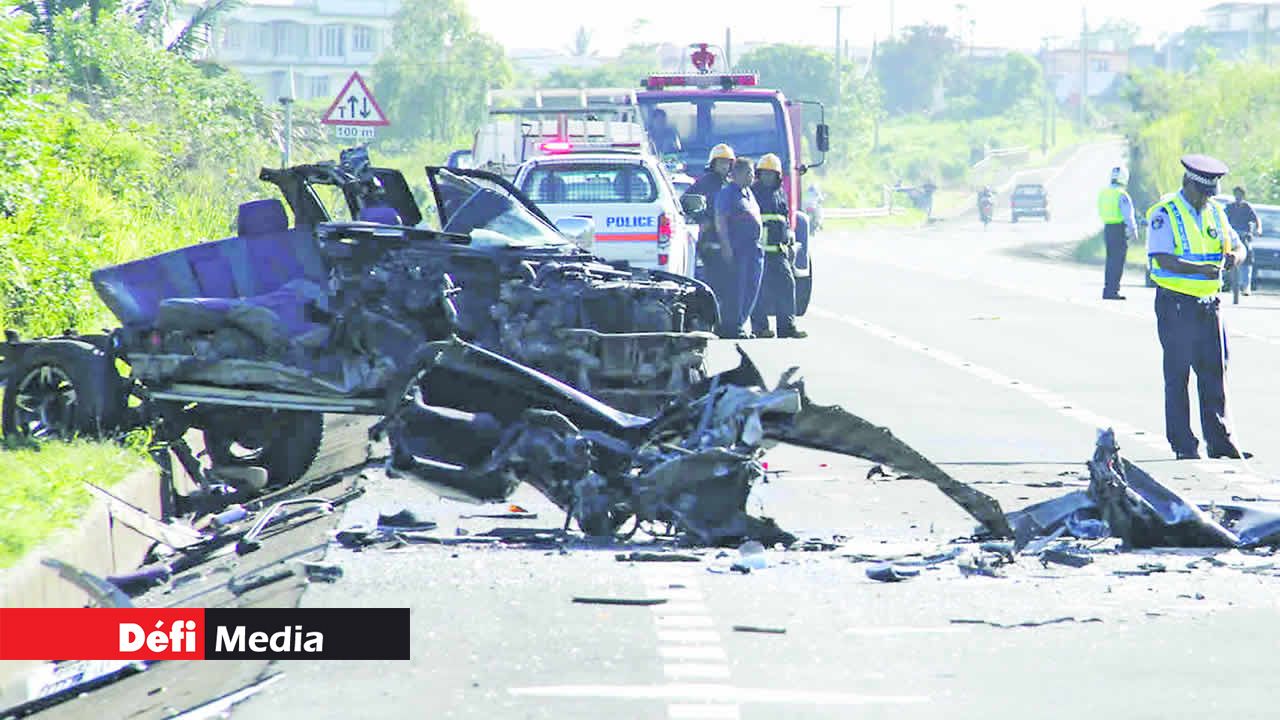
The increasing number of vehicles on our roads is a sign of economic prosperity, but alongside the number of road deaths is also on the rise. More than 150 persons have been killed due to road accident injuries since January 2017. Despite various road safety campaigns by the authorities and NGOs, road deaths are almost an everyday occurrence in Mauritius.
Publicité
The World Day of Remembrance for Road Traffic Victims (WDR) is commemorated on the third Sunday of November each year – to remember the many millions killed and injured on the world’s roads, together with their families, friends and many others who are also affected. In Mauritius, road accidents have become almost a daily feature with victims’ families devastated at the loss of near and dear ones. There are various ongoing awareness campaigns to sensitise road users on road safety. But accidents are on the rise and the authorities are helpless.
Most often, the response to road deaths is yet another road campaign by the authorities during which many drivers are bothered. Then it all subsides and everything returns to what it was, until the next series of shocking road deaths occur. The authorities clearly have no strategy as to ensuring safety on the roads other than to punish drivers for minor infractions, which continue to soar, according to statistics, despite heavy fines.
In Mauritius, there are many causes of road accidents. Speeding is by far the main reason, followed by drunk driving. Additional causes include poor road conditions, indiscipline among drivers, poorly maintained vehicles, carelessness, poor visibility, and a host of others.

Driver licensing
It is often said that it is too easy to obtain a driving licence in Mauritius. Indeed, the licensing system has known no major overhaul for decades. There is no standard driving instruction system and each instructor goes by his own methods.
The driving test itself is highly questionable as most aspiring drivers who turn up for a practical test have in fact been trained just for taking a test and not for driving properly on our roads. Scenes of hesitating candidates at the wheel in the vicinity of the Line Barracks while having their test clearly indicates they are not yet ready to take the roads!
Our driving test systems are designed to test the practical manoeuvrability of candidates, and not necessary of their ability to take appropriate decisions given current road conditions and behaviour of other road users. Once a young driver passes his test and obtains his permit, he becomes a permanent driver.
There is no apprenticeship period. There is no programme for update of skills and knowledge.
Hazard perception
Our drivers completely lack the capacity to perceive hazards ahead. Whenever an accident occurs, we often hear such excuse as “ene cout lin sorti ou traverse devan moi” (He suddenly emerged or crossed my way).
No, there is no such thing as someone emerging suddenly, except in very specific situations. A responsible and alert driver must be constantly vigilant and must foresee any potential danger lurking ahead of him over at least 200 metres. For example, when approaching a school, a hospital, a factory or any crowded venue, he must expect someone to cross the road.
If he approaches a bend or an intersection, he must anticipate a hazard and reduce his speed accordingly. If a vehicle in front has stopped, there must be a reason and you cannot blindly overtake it. Unfortunately, we see how many drivers have absolutely no notion of hazard perception and will overtake on bends, crossing continuous white lines, or overtaking even on speed humps and zebra crossing.
Hazard Perception Test is a compulsory component of driving test in many developed countries and it is something that should be considered in Mauritius. Government could perhaps sign MoUs with driver licensing agencies in those countries for the transfer of knowhow.
Penalties
Heavy penalty is a big deterrent to road offences. The thought of paying a hefty fine for committing a road offence makes a driver think twice. But tougher penalties do not necessarily bring better results. If penalties become a burden on road users, for example heavy fines on low income earners, it can create frustration and depression which is a higher risk of causing road mishaps.
On the other hand, we have seen penalties are not being used effectively. For example, the positioning of speed cameras (whether fixed or hand-held) tends to indicate that in most cases, the prime objective is to raise fine revenue rather than enhancing road safety. Otherwise, how can we explain that hand-held cameras are pointed towards drivers 200 metres from a roundabout, where drivers must automatically slow down, as if often seen at Roche Bois?
Similarly, at Caudan, we often see police targeting drivers with hand held cameras at about 100 metres before a fixed camera situated in the vicinity of the Royal College where vehicles would generally slow down! It would make sense if cameras are used along longer stretchs of roads where the tendency to speed is much higher.
Police presence
Police presence alone will deter road traffic offences. Mauritius being a small island, it is possible to increase police presence throughout our road network. We can also train youngsters into becoming traffic wardens, empower them to take action and post them across their country.
Enhanced police presence will also reduce criminal activity, making neighbourhoods safer. Unfortunately, we have a system where traffic police hide behind bushes with cameras only to pounce on speeding vehicles.
This type of ‘entrapment’ is not consistent with best practices of police business. Higher visibility will demonstrate to the public that the police are interested in proactive methods to reduce lawlessness on our roadways.
Two-wheelers
The volume of two-wheelers on our roads is rising fast because successive governments have failed to address the public transport system. People need to reach work on time, drop kids at tuition and do their shopping, and having a motorbike is a convenient and cost-effective method for a majority of the population.
Unfortunately, all our road projects are designed without considering two important categories of road users: pedestrians and two-wheelers. We have yet to implement bike lanes or cycle path on our roads.
Latest statistics show that there are about 528,013. By comparison, this figure stood at 319,440 in 2006 and 384,115 in 2010. In 2017, two-wheelers account for nearly 40 percent of our total road fleet. Incidentally, bikers account for 40 percent of road casualties.
Electric bikes
There has been a surge in the number of electric bikes on our roads, but the exact number is not captured by statistics as they are not required to be licensed by the National Transport Authority. Their riders are also compulsorily required by law to wear a protective helmet.
But just because the law does not provide for same does not mean one should not protect himself. Unfortunately, electric bike riders can be seen on our roads and even our motorways without wearing helmets.
By not bringing relevant regulations to govern electric bikes, the government is not only failing to protect these riders, but also putting at risk innocent drivers who may be charged of ‘involuntary homicide’ in the event that a careless electric biker dies of head injuries if involved in an accident.
Use of mobile phones
It is now common scene to see drivers using a mobile phone at the wheel. Worse, because drivers do not want to get caught talking on phones, they are more and more resorting to texting while driving! It is common practice for the police to carry out an alcotest on drivers who have been involved in accidents.
The protocol should be reviewed because using a mobile phone is as likely to have caused an accident as alcohol intake. Police should also checked mobile phones to see the time the last call was made or last message sent.
Pedestrians
Statistics reveal that nearly 16 percent of road victims are pedestrians. While many law-abiding pedestrians have been hit by reckless drivers, there are cases when pedestrians also act irresponsibly. For example, pedestrians do not hesitate to cross motorways instead of using flyovers. Pedestrians have also tampered with central reservation fencing in order to create gaps, while the authorities look on.
However, the authorities are also responsible for failing to provide appropriate facilities to ensure the safety of pedestrians. For example, there are many crossings that are not conveniently located. Others have been placed at the most dangerous spot. On the motorway, there are places where traffic lights have been installed for pedestrians. This is a discriminative practice.
The concept of ‘Pedestrian Island’ is non-existent in Mauritius. This would have further increased pedestrian safety especially when crossing wider roads. Similarly, the use of promontories (an extension of the curb and sidewalk) to improve pedestrian conspicuity is required at urban intersections where pedestrians are hidden by parked vehicles.
End word
Road safety remains a collective effort of both the government and the population. While the authorities must leave no stone unturned in ensuring proper condition of the roads and law enforcement, it is the responsibility of road users to maintain high level of discipline, politeness and strict adherence to traffic rules.
Speed prize
While bad drivers are punished, there is no reward for good drivers. Why not establish a speed prize? All the money collected from speeding tickets must go into a fund. Everyone who obeys the limit gets entered for a chance to win a slice of that money. Reward good behaviour and punish the bad.
Victims’ compensation
Government collects millions of rupees in terms of road fines. Why not use this fund to compensate and aid victims of road accidents and their families? Revenues from fines can also be used to finance awareness campaigns on road safety.
Alain Jeannot : “Educating road users is a necessity”
 Alain Jeannot, the president of the NGO ‘Prevention Routière Avant Tout’ (PRAT), says indiscipline on our road is one of the major causes of accidents. “It is time to bring people to their responsibilities, as lack of discipline among road users is a major accident cause.”
Alain Jeannot, the president of the NGO ‘Prevention Routière Avant Tout’ (PRAT), says indiscipline on our road is one of the major causes of accidents. “It is time to bring people to their responsibilities, as lack of discipline among road users is a major accident cause.”
Alain Jeannot, who is actively promoting road safety issues through his organisation, is alarmed at the number of road deaths, especially among motorcyclists. He believes that the nature of our road fleet is not adapted to our roads. “Nearly 40 percent of our road fleet consists of two-wheelers but our roads have not been designed to accommodate such a high proportion of two-wheelers. Bike riders are more at risk because they are more vulnerable. Mauritius is one of seven countries with the highest rate of two-wheelers per capita. Indeed, we never forcasted that one day we will end up with such a high volume of two-wheelers and the figure is set to rise further,” he explains.
But why is the number of two-wheelers increasing? Alain Jeannot says that mobility is a necessity and having a motorbike is very practical for many people. Our public transport system does not respond to the needs of many people, and this encourages them to have their own means of transport. We should find a way to either redesign our roads to safely accommodate two-wheelers or else try to reduce their numbers, as infrastructure redesign is costly.” He does not rule out unpopular measures in order to achieve higher road safety.
“The Metro Express is a good solution to improving public transport, and I hope in future it is extended to other parts of the island. The availability of convenient and comfortable means of public transportation will discourage private motoring and help reduce road accidents.” He adds that speeding is also a major threat on our roads but it is difficult to install speed cameras throughout the road network.
“We must lay more emphasis on education. Drivers must be sensitized to obey traffic rules, respect other users and maintain road discipline.” Other factors contributing to road accidents are alcohol and drug intake, poor infrastructure and poor visibility. “Unfortunately, we don’t have traffic segregation in Mauritius, as all types of vehicles use the same roads at the same time, thus increasing risks.”
His organization is currently working on how to sensitise pedestrians as there is no legal provision to regulate their behaviour. “I agree that there should be more strict rules governing pedestrians, but we must first provide them with better facilities to enhance their safety.”
Road offences
Road traffic contraventions increased by 13% from 206,839 in 2015 to 232,862 in 2016 mainly due to ‘exceeding speed limit’ which increased from 58,473 to 86,951. Speeding offences top the list, followed by drunk driving and using mobile phone at the wheel.
It is shocking to note that as many as 8,539 persons were booked in 2016 for failing to wear a seat belt. It is equally exasperating to note that police had to stop 1,485 motorcyclists to tell them to fasten their protective helmet properly!
|

Notre service WhatsApp. Vous êtes témoins d`un événement d`actualité ou d`une scène insolite? Envoyez-nous vos photos ou vidéos sur le 5 259 82 00 !





















